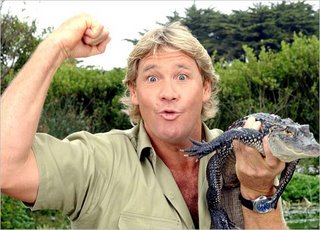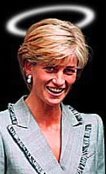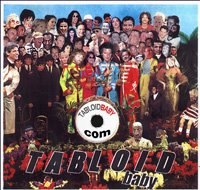 "It wasn't the stingray. It was television killed the Crocodile Hunter."
"It wasn't the stingray. It was television killed the Crocodile Hunter."The shock last night and this morning over the death of the Crocodile Hunter is a little disingenuous, isn't it? Sure, we all got a kick out of the bloke, but you can't deny he was asking for it, tempting fate by intruding on the habitat of wild animals and dangerous creatures for years. Goaded by the TV camera, he went closer and closer to the edge, and eventually it was bound to come back and bite him on the ass.
Unfortunately, it stabbed him through the chest and pierced his heart.
But we're shocked, because people aren’t supposed to die on reality television. Especially not a reality television star. Not even one as controversial as Steve Irwin.
Though the floral arrangements are being dropped off at the ticket booths to his amusement park zoo in Queensland the same way tributes were stacked outside the gates Buckingham Palace for Princess Diana, Steve Irwin was not as beloved in his native Australia as he was here in America or in Europe.
Michael Idato writes in today’s Sydney Morning Herald:
To millions of television viewers in Europe, Britain and the US, Steve Irwin-- the buffoonish, khaki-clad loudmouth who made both a hobby and a higher calling out of wrestling with crocodiles-- embodied what it meant to be Australian.
Much like Paul Hogan, who served as a cultural ambassador, and Crocodile Dundee a decade before him, Irwin's cartoonish screen persona, with his bulging eyes and enthusiastic chatter, was laughable, laudable and lovable. Not to mention immensely popular…
And yet Irwin's international success sits in uneasy contrast to his popularity in Australia. Here he was, at best, a jolly Queensland curiosity whose second wind was fuelled by a mild, pantomime-ish send-up on Nine's The Footy Show. At worst, he was an ocker-sounding self-parody who infamously held his son, Bob, in one arm, while he fed a crocodile with the other…
 In Australia, Steve Irwin was viewed as a powerbroker who hobnobbed with politicians, and whose wildlife decisions and campaigns caused great consternation among conservationists and animal activists— from turning his parents' zoo into a Down Under Wally World, to bothering penguins, seals and humpback whales in the name of entertainment.
In Australia, Steve Irwin was viewed as a powerbroker who hobnobbed with politicians, and whose wildlife decisions and campaigns caused great consternation among conservationists and animal activists— from turning his parents' zoo into a Down Under Wally World, to bothering penguins, seals and humpback whales in the name of entertainment.Steve Irwin was a larger-than-life TV personality, and he turned his schtick into a pretty good movie, but he was a guy who tromped around swamps and swam around bays with camera crews, intruding on the habitat of creatures who were not meant to have exposure to man-- especially a khaki-clad screamer who used these creatures for entertainment as much as education.
But it wasn’t really the animals the TV audiences cared about. It was Steve Irwin. He did things on camera that people weren’t supposed to do--and lived. Until he died-- on camera.
People aren’t supposed to die on reality television, not even people who hold their infants within chomping distance of a hungry crocodile (and remember, it was that child-endangering incident that caused networks and viewers around the world to shake their heads and keep their distance).
 Yet, look back and recall that Princess Diana had slipped from the good lists before she wound up shockingly dead and was quickly elevated and canonized.
Yet, look back and recall that Princess Diana had slipped from the good lists before she wound up shockingly dead and was quickly elevated and canonized.For better or worse, Steve Irwin is our Diana.
For all of us who've worked in reality television… Steve Irwin died for our sins.






































2 comments:
nice.
My friend Burt Kearns over at the great blog Tabloid Baby called Irwin's the first death of the reality TV era, having "died for our sins" as consumers of the kind of wildlife product he dished out. Irwin was a kiddie icon because of his jolly, cartoony, khaki-clad persona. To adults he was more of a spoofy curiosity whose approach crossed into self-parody. But grown-ups, if they watched Irwin's schtick at all, became fans because he did get so close to peril with such regularity. Because Irwin would joke about it, he never seemed truly close to disaster. But the truth obviously was that -- in the absence of healthy caution -- a line of patter proves a lousy defense.
Post a Comment